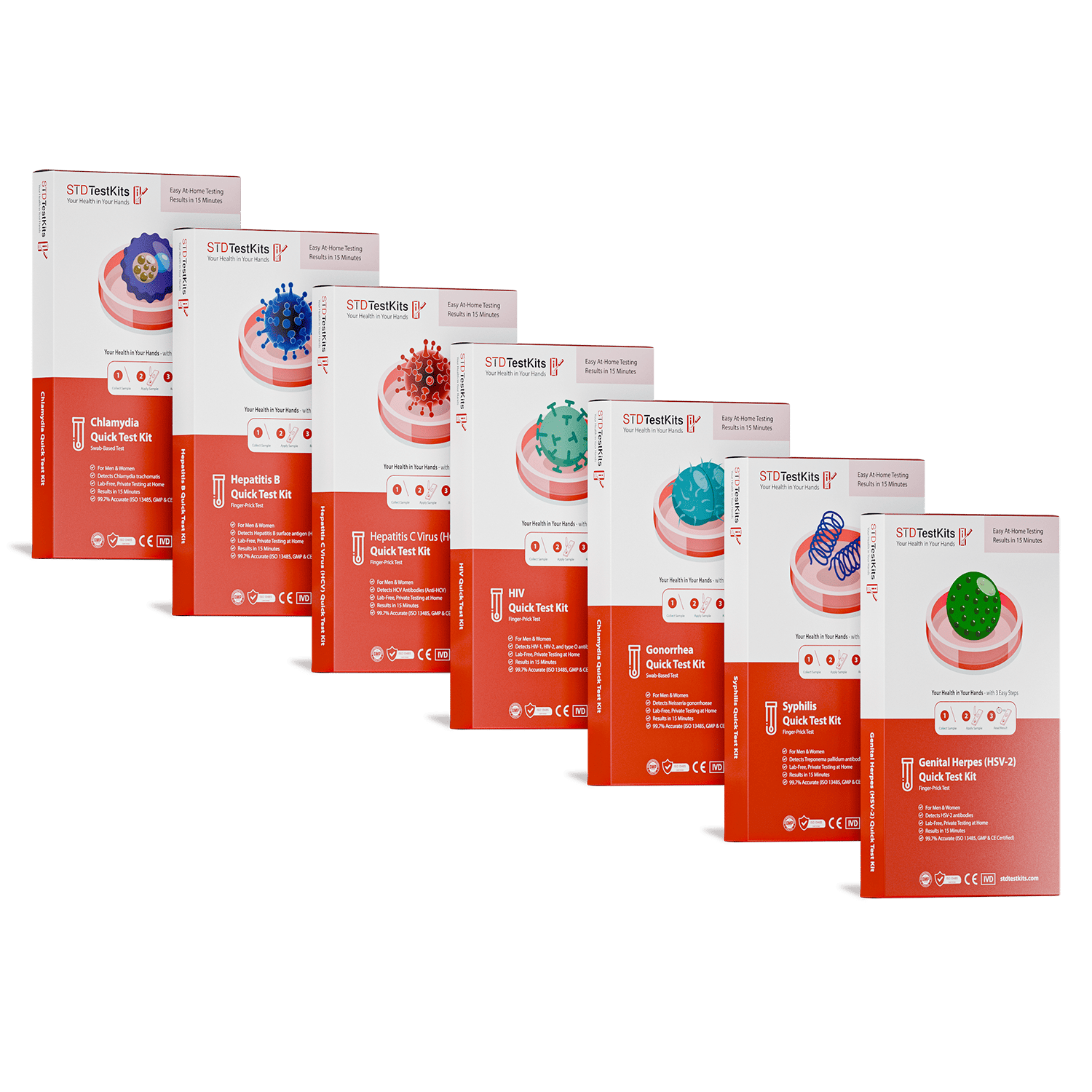Normalize It in the Group Chat: STD Testing Is a Love Language
Quick Answer: If you had sex with a sex worker, regardless of condom use, testing is recommended within 1 to 3 weeks. Many STDs don’t show symptoms right away, and early detection is key to peace of mind and prevention.
The Part No One Talks About: Regret, Relief, and Panic in the Same Night
It started as a joke between friends. A birthday weekend in Vegas. A few too many drinks. Then it wasn’t funny anymore, it was a memory, a transaction, and a racing heart that wouldn’t calm down. Jake didn’t even tell anyone afterward. Not his best friend. Not his girlfriend back home. Just his search history.
“I had sex with a prostitute, what are the chances of getting an STD?” “STD symptoms after escort” “Do condoms protect 100%?” He didn’t know what he was really looking for, reassurance or a reason to panic harder.
This isn’t about judgment. This is about facts. If you’re here because something happened, and now you’re spiraling, you’re not alone. This article is your calm in the storm. A guide built for the person who thought they’d never need it, until suddenly, they did.
Jake, 33, wasn’t looking for anything dramatic. He said it felt “weirdly normal” in the moment. The woman he met was calm, professional, and matter-of-fact. He wore a condom. She said she got tested monthly. It was fast, clean, and, honestly, forgettable. Until he got home and started overthinking everything.
“I couldn’t stop checking myself,” he told us. “Like, looking down there every time I peed. Googling symptoms. Convincing myself I felt a burn even though I didn’t.”
This spiral is common. And it has less to do with what happened during the encounter and more to do with what we’ve been taught: that buying sex is dangerous. That people who do it must be infected. That you, by association, are now tainted. But here’s the twist, those ideas aren’t based in science. They’re based in stigma.
People are also reading: How STDs Can Impact Fertility in Men and Women
So… What Are the Real Chances You Got Something?
This is where data matters more than assumptions. In multiple studies, including one published in The Lancet Global Health, professional sex workers who had access to healthcare and worked in regulated or online-based settings had *lower* STD rates than the general population of people casually dating.
Why? Because it’s literally part of the job to stay safe. Many sex workers use condoms religiously, screen clients, and test frequently. Compare that to hookup culture, where protection is optional, drunkenness is common, and communication is often nonexistent.
The risk doesn’t come from who you slept with, it comes from how the sex happened. Did you use a condom? Was there oral? Was it rough? Were substances involved? These are the questions that matter, not whether the person was a sex worker.
Bottom line: Yes, you could’ve been exposed. But no, this isn’t an automatic red alert. Let’s walk through what to look for, and when.
Symptoms or No Symptoms: What to Watch For (And Why It Might Be Nothing)
One of the cruelest things about STDs is how quiet they can be. Many don’t show up for days, weeks, or even months. Some never show up at all. You might feel totally normal and still have something brewing under the surface. That’s what makes testing so critical, even when you feel fine.
But if you’re the kind of person refreshing Google for “STD signs after protected sex,” here’s what could appear early if something *is* going on:
For Chlamydia and Gonorrhea, you might notice burning when you pee, unusual discharge, or a sore throat (if oral sex was involved). Herpes can show up as tingling, itching, or small blisters, though many people mistake it for a cut or razor burn. Syphilis might start with a single painless sore that disappears on its own. And HIV? Early symptoms look like the flu: fever, sore throat, fatigue. Easy to ignore, or panic about unnecessarily.
If none of this sounds familiar, that’s good news. But it’s not a pass. The only way to be sure is to test.
What Condoms Don’t Cover (And Why That Matters)
Let’s say you did everything by the book. Condom on, no kissing, no oral, clean exit. You still feel exposed. Here’s why that’s not paranoia, it’s nuance.
Condoms are fantastic at stopping STDs that spread through fluids. HIV, Gonorrhea, and Chlamydia are all dramatically less likely if the condom stayed on from start to finish. But skin-to-skin infections? That’s where things get slippery.
Viruses like Herpes, HPV, and even early-stage Syphilis can live on areas condoms don’t cover, like the base of the penis, scrotum, labia, or thighs. So if there was grinding, oral, or any other contact beyond the basics, there’s still a possibility of transmission.
It doesn’t mean you’re doomed. It just means you weren’t wrapped in a magic forcefield. That’s okay. The goal isn’t to eliminate all risk, it’s to be honest about it, and act accordingly.
Window Periods: When to Test for What
Testing too early can give you a false sense of security. That’s where window periods come in, the time between exposure and when an infection can be detected on a test. Think of it like waiting for a Polaroid to develop: you need to give it time to show what’s really there.
Here’s the breakdown:
Chlamydia and Gonorrhea can usually be detected within 5 to 7 days. Syphilis and HIV typically need about 3 to 6 weeks, depending on the type of test. Herpes is a wild card, blood tests only pick up certain antibodies, and swabs only work if there’s an active sore. HPV often isn’t tested at all in men unless warts appear.
Why “They Looked Healthy” Doesn’t Count
It’s a comforting thought, right? “She looked clean.” “There were no sores.” “He seemed legit.” But STDs don’t wear name tags. Most don’t announce themselves with visible signs, especially in early stages. You can’t diagnose someone’s sexual health based on their vibe.
Even if someone tells you they get tested regularly, remember this: they might still be within their own window period. They could have been exposed after their last test and not know it yet. That doesn’t make them shady. It makes them human.
Responsibility isn’t about doubting others, it’s about owning your part. You don’t need proof that someone’s unsafe to justify taking care of your body. Testing is self-respect, not suspicion.
People are also reading: UTI or STD? Breaking Down the Symptoms and Risks
The Role Stigma Plays in Delaying Action
Let’s be honest. If this hookup was with a random date instead of a sex worker, would you be panicking right now? Probably not. That’s stigma at work. It tells us sex work is dirty, dangerous, and inherently shameful. That if you paid for it, you deserve the fallout.
But let’s flip the script. Most sex workers in regulated environments are hyper-aware of health risks. Many use protection more consistently than average partners. According to a BMC Public Health study, sex workers in North America reported higher rates of regular STD testing and condom use than the general population.
Meanwhile, the average person on a dating app might skip protection during a drunk night out and never get tested unless symptoms scream at them. So what’s really more risky, the sex, or the story we’ve been told about it?
Stigma doesn’t keep people safe. It just keeps them silent. And silence spreads disease. When we remove shame, people get tested sooner. They tell the truth faster. They protect themselves, and their partners, better.
You’re probably wondering why this feels heavier than it should. It’s not just about infection, it’s about reflection. Maybe you’re partnered and this was a secret. Maybe you’re single but swore you’d “never do something like this.” Guilt has a way of showing up in your throat, not your genitals.
But here’s the deal: guilt isn’t a diagnosis. You don’t need to confess to the universe. You need to take one simple, proactive step, testing. Not because you messed up, but because you want peace of mind. Testing doesn’t erase what happened, but it gives you a clear place to stand when your brain’s spiraling with “what ifs.”
You’re allowed to feel weird about it. You’re allowed to feel nothing about it. What matters most is that you protect yourself, and anyone else you might be intimate with. Not out of fear. Out of care.
You don’t need to sit in purgatory for weeks, obsessively checking your body or refreshing medical forums. You don’t need to build up the courage to explain everything to a walk-in clinic nurse who barely makes eye contact. What you need is access, quiet, clean, straightforward access to answers.
STD Test Kits gives you that. Whether it’s a combo kit for multiple infections or a specific test, these kits are made for real people with real lives. You don’t have to be a doctor or a saint to want clarity. You just have to care enough to check.
Take control of your sexual health today. This at-home STD test delivers results fast, no shame, no spotlight, just truth.
Talking to a Partner, Without Falling Apart
If someone’s waiting at home, emotionally, sexually, or both, you might be wondering how much you need to say. Here’s the reality: you don’t owe anyone a play-by-play. But if there's even a sliver of a chance they could be exposed, transparency becomes protection, not punishment.
It doesn’t have to be dramatic. Try this: “I had a situation where I may have been exposed to something. I’m getting tested to be safe, and I’d feel better if you did too.” You don’t have to use the word “sex worker.” You don’t have to unpack your choices in real time. But you do have to own your health. And theirs.
The goal isn’t to avoid consequences. It’s to prevent hurt down the line. And if your partner’s worth keeping, they’ll appreciate the honesty, even if it’s hard at first.
Jake waited too long. He spent two weeks in mental purgatory, inspecting his body like a crime scene, reading Reddit threads that only made things worse. When he finally took a test, it came back negative. The relief was real, but so was the regret for not doing it sooner.
“I wasted so much time catastrophizing,” he said. “I could’ve saved myself all that stress with a $40 test.”
Don’t let the unknown eat you alive. You can’t undo what happened, but you can absolutely decide what happens next.
FAQs
1. We used a condom, so I’m safe… right?
Safer, yes. Untouchable, no. Condoms are brilliant at blocking fluids like semen and vaginal secretions, which lowers the odds of HIV, Chlamydia, and Gonorrhea. But if your bodies touched skin-to-skin? Herpes and HPV don’t care about latex borders. Think of condoms as an umbrella: fantastic in the rain, but if the storm is sideways, you’ll still get wet.
2. She looked totally healthy. Isn’t that enough?
Here’s the hard truth: you can’t eyeball someone’s STD status. No rash, no sores, no discharge, still doesn’t guarantee anything. Most STDs are sneaky. Chlamydia is infamous for being symptomless. So while “they looked clean” might comfort your brain, it doesn’t mean your body is in the clear.
3. It’s been three days and I feel fine. Do I even need a test?
Yes. Please. Three days is too soon for most tests anyway. Infections like Gonorrhea and Chlamydia show up around a week. HIV and Syphilis usually take a few weeks. Feeling fine doesn’t mean being fine. That’s the cruel joke of STDs, they don’t always knock loudly when they arrive.
4. Okay, but oral sex doesn’t count, does it?
Oh, it counts. Maybe not as high-risk as unprotected vaginal or anal, but still real. Ever heard of “throat gonorrhea”? It’s not urban legend, it’s a legit diagnosis. Herpes loves oral contact too. So yeah, oral is safer, but it’s not a free pass. Don’t let the word “just” fool you here.
5. She swore she tests all the time. Should I believe her?
Honestly? Probably, yes. Most pros are more diligent about testing than Tinder dates. But testing has blind spots, the window period. Someone can test negative today and still be positive tomorrow if the infection was too new to detect. That doesn’t make them a liar. It just means you still need to look out for you.
6. How do I even bring this up to my partner?
Think of it less like a confession, more like a weather report. Clear, direct, and useful. Try: “I had a situation that might carry risk. I’m getting tested before we’re intimate again.” No need for gory details unless you want to share. Honesty doesn’t have to be a soap opera, it can be love in action.
7. Aren’t at-home STD tests kind of sketchy?
Nope. At least not if you’re buying them from a legit place like STD Test Kits. These are real, medically reliable tools. Think of them as the Uber Eats of healthcare, fast, private, and at your door when you need it most.
8. Am I overreacting by stressing this much?
No. You’re reacting like someone who cares about their health. Anxiety after sex, especially paid sex, is normal. Stigma makes it louder. The fix isn’t pretending you’re chill. It’s getting answers so your brain stops writing horror stories in your head at 3 a.m.
9. What if the test is positive?
Then you treat it. No scarlet letters. Most STDs are curable. All are manageable. A prescription, a plan, and you’re on with your life. You’re not doomed. You’re not dirty. You’re just someone who caught something early, which is the best-case scenario.
10. Do I have to tell anyone this happened?
Nope. Not unless you want to. You can keep your private life private and still do the right thing by testing. Silence isn’t reckless if you’ve taken care of the risk. Sometimes self-care means drawing your own boundaries, and keeping your own secrets.
Before You Spiral Again, Here's Your Next Step
You made a choice. You can’t un-make it, but you can stop making yourself sick over it. This isn’t about guilt. It’s about being informed. Taking action. Sleeping through the night again.
Know your status. Order a home STD test today and get back to feeling like yourself, no judgment, no delay, just answers.
Sources
1. Which STD Test Is Right for Me? I’ve Had Sex with a Sex Worker – Better2Know
2. Prostitution and Risk of HIV: Male Partners of Female Prostitutes – BMJ (1993)
3. How Soon After Risky Sex Can You Be Sure You’re Clear of HIV? – VA HIV FAQs
4. How Long After Unprotected Sex Should I Get Tested for STDs? – Testing.com
5. HIV Prevention for Sex Workers: What You Need to Know – PrEP Daily







